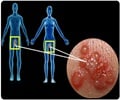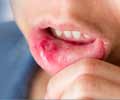Researchers have come out with a novel method of preventing infection that are caused by highly common herpes simplex viruses.

Dr. Herold and her colleagues had previously shown that infection by the herpes viruses depends on calcium released within the cells. In this study, they found that calcium release occurs because the viruses activate a critical cell-signaling molecule called Akt at the cell membrane. As part of their investigation of Akt's role in herpes infections, the researchers took laboratory cultures of those human cell types and mixed them for 15 minutes with four different drugs known to inhibit Akt. The cells were then exposed for one hour to herpes simplex virus 2. All four drugs significantly inhibited herpes virus infection in each of the cell types.
By contrast, cells not pretreated with the Akt inhibitors were readily infected on exposure to the virus."For people infected with herpes, the drug acyclovir helps prevent herpes outbreaks from recurring and lowers the risk of transmitting the infection to others," said Dr. Herold. "But some people have herpes infections that don't respond to acyclovir, and unfortunately there is no effective vaccine. So new approaches for suppressing and treating herpes infections are badly needed, and our findings indicate that inhibiting Akt should be a useful therapeutic strategy to pursue."
Source-Eurekalert









